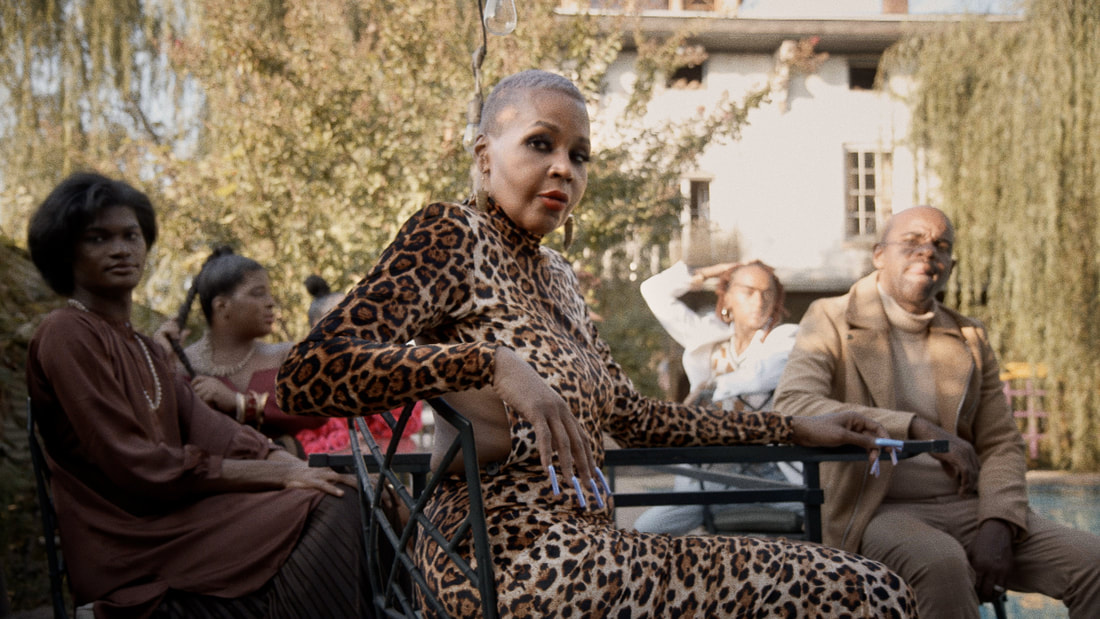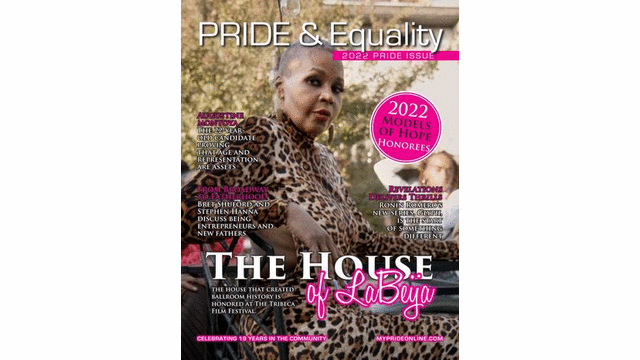|
When representation is lacking, you take matters into your own hands. In 1972, Crystal and Lottie LaBeija had tired of the racially oppressive environment the drag pageant system of the 60s had created. In response, the two built The House of LaBeija, birthing the house culture of the ballroom scene. This house continues the legacy of making space for POC youth in the community and uplifting the women that carry on the name. That mission is being expressed in the new short film, “The House of LaBeija” by Director Fregdy Noël. The film will premiere at the Tribeca Film Festival in June. Noël shared how the idea came together and the environment of the production process.
"I'm lucky to have a relationship with the father of the house, Marcus. He knew I wanted to do - some artistic work with the house. So when he said they were ready. I was like, wait, am I ready?", shared Noël. "I started thinking - there was this idea of being at home, and I just thought, what does that good home feel like? There's struggle there, but there is also beautiful joy. When I look at the House of LaBeija, I see that community. I see that support. I saw that love and wanted to bring it back to the house. As an artist, I'm like - this is a mansion - let's place it there. Let's talk about that. Not in the “talking head” kind of way. Let's tell a story that's poetic. Let's look into our past - think about what home was like when we were children and what it is like now. I wanted to connect with them on that. Just seeing all the different letters that they wrote was just so beautiful. I didn't want to make a film that was performative. I wanted it to be intimate. I wanted you to see them as human beings with stories, with range, all of it. The only way to get that is when - they write their own words, and it just went on from there. It was a day of connection, fun, and collaboration because everybody worked together to make this what it is." The collaboration consisted of house members Jasmine Rice, Jeffrey, Bougie, Diovanna, and Housemother Samil. They got an opportunity to look at how they each got here while sharing inspirational words about their journey. The story of ballroom and houses is a new concept for some youth, only coming to life with shows like Pose and Legendary, so there truly is an education behind the film. Bougie was not surprised the film was nominated, but it was a shock to be a part of such a prestigious event, "I have never pictured myself in something as big as this," shared Bougie. “The people who know why I came to New York know that I was here to do some modeling and didn't see anything else behind that. But since I joined this house, I've had more depth to myself. Being in this short film and being featured at the Tribeca Film Festival is something I could not imagine." For Jeffrey, the experience is storytelling - letting people of color share their stories and own their content. "When it comes to the safe places that we provide, and when it comes to chosen families, it comes back down to the content," shared Jeffrey. "I just think it's very important for people of color to own their intellectual property. House of LaBeija is the first house to have seven chapters trademarked, and I'm proud of that. It will be left to this house to do the right thing - to tell their stories as people of color and to have a seat at the table when it comes to creating content, instead of someone coming in and telling our stories. I feel like that is my legacy. Then I feel the universe brought Fredgy to us and gave us this wonderful opportunity. For you to take a look in the looking glass of how we are empowering people who look like us - to tell your older self you're going to be okay. We are living proof that we are going to be okay." He is also excited to see how the ladies will light up the red carpet in their outfits. “That's what ballroom is about. It's about a fantasy - one night of looking over the top, but we're going to be 'in the reality'. I'm just so humbled that I'm getting an opportunity to be who I say I am. I'm just over the roof with all of it.” Samil saw this moment as an opportunity to open up about topics she kept close to the chest. "It was a lot because I did not think I would be voicing my opinions and how I felt and speaking about growing up - going through a divorce with my parents, and turning to alcohol as a source of relief for over six years. I don't talk about that as much as I should because it should be something that would help my house members. Alcohol is an addiction. The same goes for drugs, so expressing how I felt with that - becoming independent at 17 and just making it on my own ever since. Then, going into the medical field, having to deal with HIV-positive patients, being the one who would do the testing, letting them know whether they were positive or negative. I never talk about these things, but it is the perfect time for me to express what I've been through and all my service within the community. I'm proud of it. Now it's time for me to speak on it and have gratitude for everything I've been through. I'm very thankful.” Diovanna, the youngest of the bunch, looked to the 'voice' of the film. Touching on the fact that many do not know the people projected on-screen - how they sound and feel. This film allows audiences to experience it. "One of the most powerful things, even watching it back, was hearing our voices read the letters. I remember the day of - it is a very intimate and vulnerable moment when you have to like to record your writing and hear it back and hear your voice and what that sounds. Not coming out of your mouth, but like coming back at you,” says Diovanna. “I think for ballroom so often we see videos of ballroom people where they're not talking. Legends and icons who passed through ballroom, and you don't know what their voice sounds like. This film is so important because it's not about how many categories you walk, how many trophies you have, and ‘oh the glitz, the glamor, the fantasy'. It's the reality of every person in the film. You not only see them doing what we do but hear our voices narrating the entire thing. I think that, in and of itself, sets it apart from anything done for ballroom, period. We have a lot of documentaries in ballroom, but a lot of the people in you don't know them. You don't know their life, their story, where they come from. Again, I think it's just a poignant piece of film, in cinema, that has arrived at the perfect time." “It is so much bigger than this moment. It is so much bigger than who I am and what kind of title I have. Even the last name that I have,” Jasmine Rice added. “Being a part of this story happened because of the icons, the Legends, the Hall of Famers, and the leaders and the POC, transwomen who came before us. I wouldn't be sitting here today giving you this interview, allowing my voice to be heard in this film, without those amazing women, people, and individuals. I'm thinking to myself, after I am gone, who is going to be to share my voice and take it as inspiration and a new source of light? Because LaBeija is a source of light. That is why we call it The Last Sunshine. The possibilities that come through this project and all of our voices heard. I think it brings so much hope and positivity, and I feel we need that right now in this current climate. Fredgy summed up the experience beautifully. "So emotional. I get emotional every time I talk about it because you see the love there. That is such an important thing for me to witness and be a part of," Noël continued. "We started in the morning. That was when [we read the letters]. It was a great way for me to connect with each member individually. It showed that vulnerability because it is equal. As a director, I think it is important to show my vulnerability, even just in being there, so that we can have this shared experience. Then when it came time to do the movement pieces in each room, I had set up each room for each member and was hoping everyone would like it. I also had them create their personal soundtrack to move and be in their bodies. It was a party. Honestly, we were dancing. I was dancing. I have a story for each room. I can talk about everyone, but yeah. It was just a lot of fun. It was just a range of feelings." Crystal and Pepper's determination to build a house became a home. When it comes to one word that describes The House of LaBeija, there are many - empowerment, complex, radiant, resilient, timeless, sunshine, royal. After having the opportunity to interview this legendary house, I'll go with the word family. The House of LaBeija premieres at Tribeca in June. Learn more at https://tribecafilm.com/films/house-of-labeija-2022.
1 Comment
|
P&E - After PrintHere are some of the latest articles and topics in the GLBT community. Archives
June 2024
Categories |



 RSS Feed
RSS Feed
